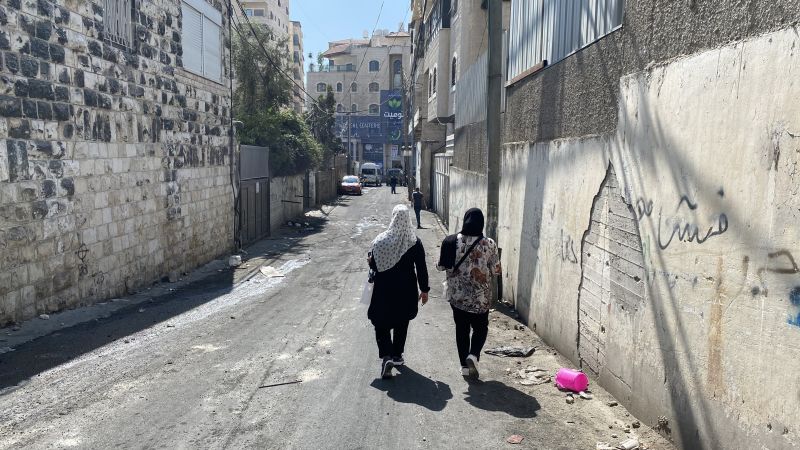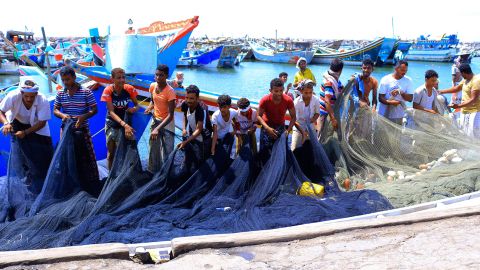
Editor’s Note: A version of this story first appeared in CNN’s Meanwhile in the Middle East newsletter, a three-times-a-week look inside the region’s biggest stories. Sign up here.
Shuafat Refugee Camp, Jerusalem
CNN
—
The people of this isolated, poverty-stricken island of refugees from the wars of 1948 and 1967 have never had it easy. But in the past two weeks, conditions at the Shuafat camp in East Jerusalem have become even more unbearable.
Israel has made life more difficult for the residents of the Shuafat refugee camp since an October 8 attack at the camp’s military checkpoint left one Israeli soldier dead and another seriously wounded.
Since then, Israel Defense Forces troops have invaded houses in the middle of the night, using stun grenades and tear gas intensively in and around the houses as they searched for the suspected gunman, a resident, Udai Tamimi. Tighter restrictions created long lines of cars at the entrance to and exit from the camp, leaving residents with the feeling that Israel is denying their freedom and their movement.
“They are collectively punishing us,” resident Asa’ad Ali said. “We are in a crisis situation. The policy on the checkpoint is humiliating us to prove that they are still in power after the security failure that happened on the day of the attack. If you go to the zoo in Jerusalem you will find animals getting rights that we haven’t had here for decades.”
Ten days after the checkpoint shooting, not far from where Tamimi was thought to be hiding, he carried out a new shooting attack, leaving one Israeli soldier lightly injured, before he was shot and killed by Israeli soldiers. Israel responded by imposing even more restrictions on the refugee camp where he grew up.
More than 130,000 Palestinians live in the East Jerusalem refugee camp of Shuafat and the adjacent town of Anata, according to the camp’s information center. It’s the only Palestinian refugee camp left inside the municipal boundaries Israel constructed for Jerusalem after taking control of the eastern part of the city in 1967. But although it is within the municipality, the camp lacks any proper infrastructure or services that other neighborhoods in Jerusalem are getting, such as garbage collection, water pipes, sewage system and sanitation.
Jerusalem municipality authorities did not respond to a CNN request for comment on the lack of public services in the refugee camp.
A wall isolates the camp from the rest of the city. Camp residents, who all hold Jerusalem Israeli identification papers, have to cross through a checkpoint into Jerusalem for schools, work and shopping.
Atallah Ismail was in mourning for his mother last week as the search for Tamimi was going on. She died two days after the checkpoint attack in a hospital in Jerusalem. Ismail was not allowed to be with her.
“They are pushing us to lose the last drops of hope. Life is getting more and more unbearable here,” he said. “I couldn’t say goodbye to my mother. We couldn’t even think of bringing her body to her house before burial so people who loved her and were raised by her can see her for the last time. Because there is a closure that will also prevent us from taking her to the cemetery, she was buried without a funeral in Lion’s Gate cemetery.”
Israel denies that the Shuafat camp is completely closed
“The Shuafat checkpoint has been open since Monday [October 10] to vehicle and foot traffic under a strict check carried out in accordance with the operational need, as part of the continued hunt for the terrorist who carried out a shooting attack at the site a few days ago,” Israel Police said in a statement on October 12.
A general strike was announced in the camp the day of the police statement as a rejection of what residents see as a blockade, the nightly invasions of residents’ houses, and arrests by Israeli police who were still looking for the shooter.
Hundreds of young men blocked the entrance of the camp that day. Shops closed their doors and Israeli police and border police stood in opposite, ready for clashes.
Maha Abrash, 35, had an appointment at the hospital as she was in her 32nd week of pregnancy.
“I am so worried about losing my baby or giving birth early. I’ve been in pain for three days and tear gas really affected me badly,” she said. “I tried to cross three times but we cannot use cars to cross and only allowed to walk through, but standing in the line can take hours.”
Violence and tensions in the West Bank and East Jerusalem have been escalating rapidly this year, with more frequent incursions by Israeli forces into the West Bank and more shooting attacks by Palestinians in the West Bank and Israel.
Residents of Shuafat refugee camp see it as a ticking bomb, and accuse Israeli politicians of playing a game with their lives before elections on November 1.
“If I wake up and I do not find bread or milk or basic needs for my children because of Israel then yes, I will go for an attack,” said camp resident Asa’ad Ali. “It is teenage-style Israeli politics … .they should let people love life because it’s either we live in dignity or we die. They should give people their rights instead of looking to how to put them down in the earth.”
Top adviser to Iran’s Khamenei calls for reopening of Saudi, Iranian embassies
Iran and Saudi Arabia must reopen their embassies to facilitate a rapprochement between the two regional rivals, a top adviser to Iran’s supreme leader said on Wednesday, amid moves by Tehran and Riyadh to revive ties, Reuters reported. “We are neighbors of Saudi Arabia and we must coexist. The embassies of the two countries should reopen in order to solve our problems in a better way,” said Ali Akbar Velayati, according to the semi-official ISNA news agency.
- Background: Iran and Saudi Arabia, the leading Shiite and Sunni Muslim powers in the Middle East, severed ties in 2016 with both parties backing opposite sides in proxy wars across the region, from Yemen to Syria and elsewhere. Last year, Tehran and Riyadh began direct talks in an attempt to improve relations. Baghdad has hosted five rounds of talks so far, the last in April.
- Why it matters: Iran has accused Saudi Arabia of supporting the protests that have gripped the Islamic Republic, saying its media coverage has “provoked Iranian youth.” This week, the commander of Iran’s powerful Revolutionary Guard Hossein Salami warned Saudi Arabia against interfering.
Israel to help Ukraine develop air defense alert system but it will not send weapons
Israel will help Ukraine develop an air defense alert system, Israeli Defense Minister Benny Gantz announced Wednesday, but the country does not plan to deliver weapon systems.
- Background: Gantz made the announcement during a meeting with European Union ambassadors in Israel. But Gantz added that while “Israel supports and stands with Ukraine, NATO and the West,” and will continue sending humanitarian and defensive equipment, “Israel will not deliver weapon systems to Ukraine due to a variety of operational considerations … we will continue to support Ukraine within our limitations, as we have done in the past,” he added. Ukrainian Ambassador to Israel Yevgen Korniychuk told CNN on Wednesday that Israel’s offer however came “too late.”
- Why it matters: Gantz’s comments comes days after Dmitry Medvedev, the Deputy Head of Russia’s Security Council and former Russian president, warned Israel against supplying military weapons to Ukraine. Medvedev’s warning seemed to be in response to an Israeli government minister tweet that it was time for Israel to provide “military aid” to Ukraine after Russia began using Iranian- made weapons.
Iranian sports figures urge FIFA to ban Iran from World Cup
A law firm has sent a letter to FIFA on behalf of a group of former and current Iranian sports figures which urges football’s governing body to suspend the Iranian Football Federation and ban it from participating in the Qatar 2022 World Cup.
- Background: “Iran’s brutality and belligerence towards its own people has reached a tipping point, demanding an unequivocal and firm disassociation from the footballing and sports world,” a press release issued alongside the letter reads. The letter says the actions of Iran’s football federation violate FIFA statues and regulations. CNN has reached out to FIFA and the Iranian Football Association for comment.
- Why it matters: In September, 22-year-old Mahsa Amini died after she was detained by the country’s morality police for apparently not wearing her hijab properly. Iranian authorities have since unleashed a brutal crackdown on demonstrators, who have united around a range of grievances with the country’s authoritarian regime.
Iranian authorities’ playbook for silencing dissent includes stalking, torturing and disappearing opponents of the regime. Watch the report by CNN’s Jomana Karadsheh:
Visitors arriving in Qatar for the World Cup will soon be able to visit two of the country’s newest residents – a pair of giant pandas.
The pandas arrived this week to their new home in Qatar and are a gift from China ahead of the coming World Cup, when visitors will be allowed to see them.
The pandas normally live in southwest China’s Sichuan Province, and are accustomed to temperate forests, high in the mountains.
Originally named Jing Jing and Si Hai when they lived in China, the pandas were given new Arabic names for their life in the Middle East. Jing Jing now goes by Suhail, and Si Hai is now called Thuraya.
The 4-year-old male and the 3-year-old female will be staying in an enclosed indoor space that mimics the dense forest of their natural habitat back home, said Qatari state media.
Qatar lies in a hot, desert climate, but boasts that it is the first Middle Eastern country to host the black-and-white creatures and provide them with a suitable environment.
The pandas will quarantine for 21 days before any visitors can see them, and will be living at the Al Khor Park, which lies 35 km outside the capital Doha.
“It is expected that the panda park will be one of the most important tourist and leisure destinations that will attract visitors from inside and outside Qatar,” said Qatari state media. The tiny Gulf state is expected to welcome more than one million fans over the duration of the Cup, which kicks off on November 20.
Pandas are considered a national treasure in China. They were presented to Qatar as a sign of the two countries’ strong friendship, said Qatari and Chinese state media.
Under the agreement signed between Qatar and China, the pandas will live in Qatar for the next 15 years, said Chinese state media.
By Nadeen Ebrahim


